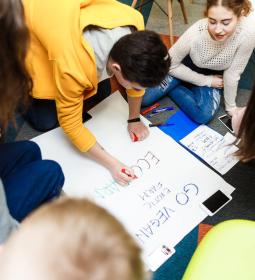At what age is it better to send a child to school? How do you know that it's time to go to the first grade? Oh, how many lances have been broken in these discussions! We will also express our opinion, and you can discuss in the comments whether you agree with us or not.

Signs that the child is ready to go to school
No, these are not only purely academic skills – they say, if he knows how to count and write, let him walk. It is necessary to take into account psychological, emotional, social readiness, and educated motivation.
In general, psychologists agree that a child is ready for school if you can answer the following questions in the affirmative:
- The child understands that school is different from kindergarten or life as a preschooler, he is interested in trying new things, understanding what is happening there,
- He is ready to communicate with children and adults, is not afraid of communication, answers questions and appeals to him, is able to turn to someone first,
- He is at least somewhat assiduous, can do the same thing for a while without switching attention,
- He has developed memory, attention and speech according to his age (such a conclusion can be given to you by a psychologist and/or neurologist).
Psychology
Fortunately, now most schools conduct interviews, tests, and trial days with children before enrolling first-graders. In principle, it is the school psychologist responsible for the admission of preschoolers who will be able to find answers to the questions above (together with you). There is no need to be afraid of the interview, it is usually simple and short: the child will be asked what his name is, how old he is, where he lives, he will be asked to tell about his parents, family, friends or pet.
A trial day is very useful — or, in principle, some kind of "test time" in the chosen school under the supervision of a psychologist. This way it will be possible to assess how much the child is ready to play with others, whether he follows the rules (and whether he is ready to invent his own, with which others will agree!), whether he has leadership inclinations. To what extent is the child ready to interact with other children and adults, can he defend his opinion and take into account someone else's? And if there is a conflict, how will it behave – and will it become the cause/instigator of it?
Of course, no one has canceled the good old confidential conversations! Talk to the child about what he thinks about school, whether he expects something from it, maybe he is afraid of something, something worries him. What role does he see himself in? How does he imagine the learning process in general?
Game Methods
School is radically different from kindergarten and in principle free preschool life, so the child must be prepared for school in advance and gradually. It is best to use playful, native methods for this, because they work best at such a tender age.
For example, one of the primary tasks is the development of perseverance, concentration, and discipline. There are many games that are ready to develop these qualities in a child (at the same time strengthening his memory), many of them can be played online, you can go to special development centers or take a couple of consultations from a specialist and study at home on your own. Usually, such games have very clear rules: the child either learns to follow them, or cannot play with others in principle. In addition, this is how responsibility and independence are brought up.
As always, reading will be a great help. Read fairy tales, novels, stories, and then discuss what you have read. So you can develop your child's logic, building logical chains, cause-and-effect relationships.
Rules of Conduct and Ethics
It's great if there is an opportunity to conduct a small tour of the school (still empty): here we go in, undress and change shoes, here are halls, stairs, here is your office, here is the toilet, here is the first-aid post, here is the canteen... This will help the child feel more confident in the most exciting first days.
Be sure to discuss that the future student has both rights and responsibilities: you need to listen to adults, but you also need to defend your interests. The main thing is to make it clear that with any controversial situation, the child can come to dad and mom.
Communication
This is perhaps also a skill from the top 3 necessary for every first-grader, especially if the child did not go to kindergarten or similar early development groups, preparation for school. True, the good old sandbox and games in the yard, sections and additional circles will always help! Any experience of communication will prepare the child for the fact that the circle of communication can change, that there will be people around him, at first strangers, very pleasant to him and not so much, and you will need to be able to build communication with everyone.
The ideal option is when shortly before September 1, the school organizes meetings between children and parents: this is the practice of communication, and acquaintance with the teacher, and the first memorization of school spaces and classes. As a rule, even a week or two is enough for a first-grader to go to school with pleasure and without fear, because there are already many familiar things for him.
How to deal with bullying
We sincerely hope that everything that is written below will not be useful to you, but forewarned is forearmed. Cases of bullying are found even in kindergarten, so you need to know what to do at any age.
The most important rule: the victim is never to blame for bullying!
It is always necessary to solve the problem:
- Quickly
- Comprehensively.
Involve teachers, psychologists, other children with their parents, the school administration, and the class teacher. Does the teacher provoke conflicts, does he turn a blind eye to bullying and unfair attacks, is he always tactful? In primary school, the teacher is an indisputable authority for children, it is he who sets the vectors of their behavior, it is he who is responsible for a comfortable, friendly atmosphere.
Bonus: How to return to school after the holidays
But it's not just first-graders who have a hard time! It is difficult to get out of the free summer days to early rises and school schedules at any age, so children inevitably get an increased level of anxiety and stress. How can we help them cope with them?
The main thing is to start preparing in advance, smoothly, gradually. There is no need to torment the child throughout August with the repetition of the curriculum - for this there will be a good half of the first quarter, do not take away the summer from him! But if you slowly, without fuss and crazy eyes, start buying new clothes and shoes, school supplies and textbooks, "practice" packing, begin to debug the daily routine, then by September 1, the child will come not only more collected, but also calmer and ready to study.










